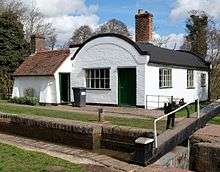Lengthsman
The term Lengthsman, coined in the 1700s, originally referred to someone who kept a "length" of road neat and tidy, but lengthsmen were used on canals and railways from the beginnings of both.[1] On roads, lengthsmen were responsible for a few miles between adjacent villages and sometimes their duties encompassed the village itself. Employed by local parish councils, their job was, inter alia, to keep grass and weeds down in the verge, keep drainage ditches clear, and sometimes repair fences. Litter, such as it was in those times, was collected and even wild flowers were tended to.
Lengthsmen on canals

The term "lengthsman" was applied to specific workers on the English canal system from its inception in the late 18th century, "lengthsmen" being responsible especially for lengths of towpath and in the absence of a lock-keeper, for locks and their trappings and surroundings. Many lived in isolated cottages which, if close to a lock, might include the duties of lock keeper, including the management of water levels and the controlling of weirs. Lengthsmen might also be responsible for repair and maintenance of banks on their "length", including the cutting of reeds and vegetation and the treading of puddle clay into sections of bank which were weak or suffering from leakage.[2] A feature of the Thames and Severn Canal was the provision of unusual accommodation specifocally for lengthsmen. The buildings were circular and had three floors. Five of them, dating from the 1790s, remain to this day.[3] See the Listed Building register.[4]
21st century Lengthsmen
Lengthsmen are still employed on land by some parish councils (or groups of councils to enable financing). (e.g. Wyre Council 2011 [5]).
Lengthsman tasks now are usually in tending areas of a central "common" or, if appropriate, significant parts of the village such as greens, drainage into fields and public areas. The term was picked up by the English organisation, National Parks,[6] to define certain volunteers on "special projects" in [those] parks including, but not exclusively, hedge-laying and wall-building.
In 2014, the term was resurrected by boating volunteers for use on Inland Waterways in a digital age.[7] As of August 2014, the development is "Work In Progress" in and around London waterways under the initiative of Ron Gooding.[8] The Lea and Stort rivers on the Herts. Essex borders are separately involved as of October 2016, but are not yet fully surveyed or organised.
Special Project lengthsmen
A small number of canal boaters undertake Special Lengthsman Projects exclusively and in isolation. (Maffi Oxford[9])Through the autumn/winter of 2015/16, the Grand Union Canal milestones from Brentford to Braunston were marked, as a Special Lengthsman Project, by the planting of a single daffodil bulb by a volunteer en route between the terminals. Spring 2017 is eagerly awaited to see whether this Special Project may demonstrate how the Canal Lengthsman initiative can make a tangible visible difference to boaters perception of uncoordinated cooperation.
On the River Darent in Kent, Lengthsman Hugh Nisbet single-handledly excavated almost 200' of neglected and abandoned quayside (photo needed!)over a six month period by dedicating a couple of hours once a week.[10]
Grand Union Lengthsmen
Through the winter of 2015/16, the Grand Union Canal milestones from Brentford to Braunston were marked, as a Special Lengthsman Project, by the planting of a single daffodil bulb by a volunteer en route between the terminals. Further potential GU lengthsman groups and individuals were identified enroute at the Slough Arm, at Coxley, Stoke Breurne and Blisworth as the markers were counted to Braunston.
Active Lengthsman teams exist on the Slough Arm of the Grand Union Canal and the southern reaches of the Grand Union Canal. Croxley Green on the Herts Berks borders is involved via the Croxley Green Parish Council which is fully engaged via their "Towpath Taskforce" endeavour in liaison with the [11] Canal & River Trust.
River Darent Lengthsmen
In 2015, a lengthsman team commenced duties at Dartford and Crayford Creek under the guidance of Ashe Hurst[12] and Gerry Lane.[13] Early in 2016, Hugh Nisbet[14] assumed lengthsman duties for Dartford lock and quay, following the 18th century practice of Lengthsmen undertaking lock-keeper duties in the absence of an official lock-keeper. Over a period of some six months Mr.Nisbet excavated the entire length of the wharf lock and quay unearthing masonry and artifacts that had been buried for years.
Bibliography
- McKnight, Hugh (1987). The Shell Book of Inland Waterways. David & Charles. ISBN 0-7153-8239-X.
References
- ↑ Russell 1991, ISBN 0-7153-9169-0
- ↑ McKnight 1981, p. 116
- ↑ McKnight 1981, p. 88
- ↑ Historic England. "Chalford round house (132864)". Images of England.
- ↑ http://site.wyre.gov.uk/Page.aspx?PvnID=85636&PgeID=76236&ClgPN=19%2f09%2f2011&ClgPV=85412&ClgPg=76055&BrdCb=1-24-344-347-477-76050-76051-76052-76053-76055
- ↑ http://www.nationalparks.gov.uk/aboutus/jobs/volunteerawards-2013/volunteerawards-groups-2013
- ↑ https://www.facebook.com/groups/788211934543911/
- ↑ https://www.facebook.com/ron.gooding.10?fref=ts
- ↑ https://www.facebook.com/maffi.oxford
- ↑ https://www.facebook.com/groups/1493013297641232/
- ↑ https://canalrivertrust.org.uk/volunteer/ways-to-volunteer/towpath-taskforce
- ↑ https://www.facebook.com/ashe.hurst
- ↑ https://www.facebook.com/gerald.j.lane
- ↑ https://www.facebook.com/hugh.nisbet.3